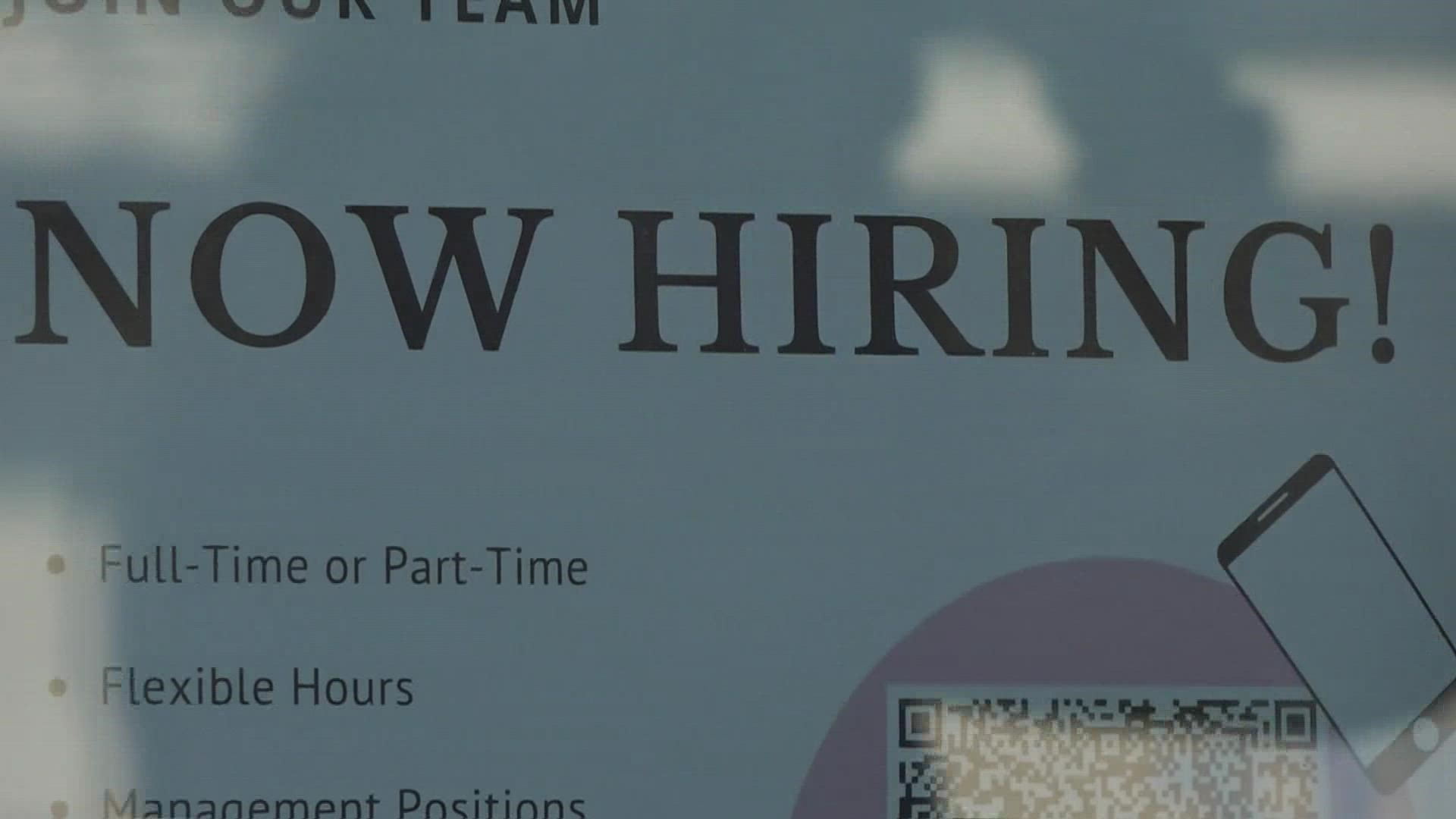NEW ORLEANS — From our grocery stores and restaurants, to our homes and cars, there aren’t enough employees to meet current demand.
The nation’s worker shortage, largely brought on by pandemic layoffs, furloughs and resignations continues to have a ripple effect across the economy.
“I think we were all surprised by the pandemic and I think there’s a lot of impacts that we weren’t necessarily expecting,” said Tulane University associate professor of economics Patrick Button.
Button watches the labor market closely. He says many former workers have new workforce interests; jobs that better fit their lives and needs.
“We’re sort of going through a big work rethink, everyone is rethinking the nature of work, trying to figure out how can I get a better work-life balance and how I can balance my family responsibilities with work,” Button said.
Button says more than a year of rethinking work is a big reason help wanted signs and job fairs seem to be everywhere, trying to fill employment needs. One big need right now is for truck drivers. The industry is a driving force of the economy, seemingly stuck in neutral.
“Because of the shortage in the industry we’re seeing companies that have had five pay raises in the last six months,” said vice president of Coastal Truck Driving School Hauser Reboul.
Applications are up this year at Coastal Truck Driving School, on track to be the highest year of applications ever.
“COVID kind of gave me an opportunity for a career change. I used to work in the plants, and I wasn’t really liking the stability in that,” said trucking student Patrick Latshaw.
Current transportation needs, combined with a need for workers at ports like those in California, create supply chain issues impacting just about everything we buy.
“We’re not getting everything we order,” said Trey Lanaux of Langenstein’s Supermarket. “We maybe get 75 percent of what we order.”
At places like Langenstenin’s, delivered goods can be unpredictable and when combined with transportation issues, holiday meals could look a bit different this year.
“I’m hearing that a lot of staples might be in short supply, so we’re worried about that.” Lanaux said.
What's happening is being called a crisis by the U.S Chamber of Commerce.
“If the issue is not addressed, the American consumer is going to see price increases across the board,” said vice president of supply chain policy John Drake.
That’s because Drake says demand for goods is increasing, but the supply and the workers are slow to catch up.
“I don’t see this challenge being fully behind us until the end of next year and possibly into 2023,” Drake said.
Finding workers to fill gaps in the economy isn’t easy and keeps folks at Express Employment Professionals in Covington busy.
“Our phones ring off the hook, nonstop,” said business development manager Melissa Martin.
Martin says her company works with a lot of former employees wanting to re-enter the workforce.
“All walks of life come through here and people will say, ‘You know what, I’m looking for a job that pays $5 more than what I’m making and I know I can find it,’” Martin said.
Numbers from the U.S. Bureau of Labor Statistics show Louisiana’s unemployment rate was just more than five percent when the pandemic took hold in March 2020. Just a month later, it more than doubled to just over 13 percent. Fast forward to August 2021, the unemployment rate has dipped down to 6.2 percent.
“Families are now ready and job seekers are now ready to go out and work again,” Martin said.
Weekly unemployment insurance claims from the Louisiana Workforce Commission show both initial and continued claims are dropping. Button says those extended benefits and those from the federal government generally don’t lead to labor shortages.
“The concern that people have is that people sit on these benefits and don’t look for work and while it does increase the time it takes for someone to get a job, it’s only a small effect and in a lot of ways it avoids the issue of people taking jobs that they really wouldn’t be a good match for,” Button said.
That’s exactly what Martin sees happening. People are getting back to work, just not in ways they once did.
“Once those extra payments stopped, we saw a large increase and job seekers coming through saying this is my opportunity now; I want to try something different,” Martin said.
Martin says a lot of people, especially those once in the retail, service and hospitality industries are looking for higher pay, better benefits and flexibility.
“We’re seeing a lot of people that were in the retail industry and we’re now placing them in office positions, office services, within hospitals, and hotel management,” Martin said.
Button says as the economy grows, so does competition to attract workers, in a way that didn’t exist before the pandemic.
“We’ve seen a lot of businesses that offer remote work or offer more flexible work arrangements get a lot of applications,” Button said. “So, businesses that are innovative in workplace flexibility are really reaping the benefits.”
“This is just the new reality. It’s the world we live in,” said owner of NOLA Brewing Company and NOLA Pizza Company Doug Walner.
At NOLA Brewing Company in New Orleans, there are full benefits — health, vision, dental, and two weeks paid vacation. Those are enticing benefits not too common in the service industry.
“The pandemic has forced us to get creative about how do we pull people in, how do we get people here,” Walner said.
As more people go through that rethink process, businesses are paying attention and, in the end, applicants get the upper hand.
“People are getting a lot more job offers when they apply for jobs, so they do have more bargaining power, so that works in their favor,” Button said.
A favor reshaping not only how we work, but where.

